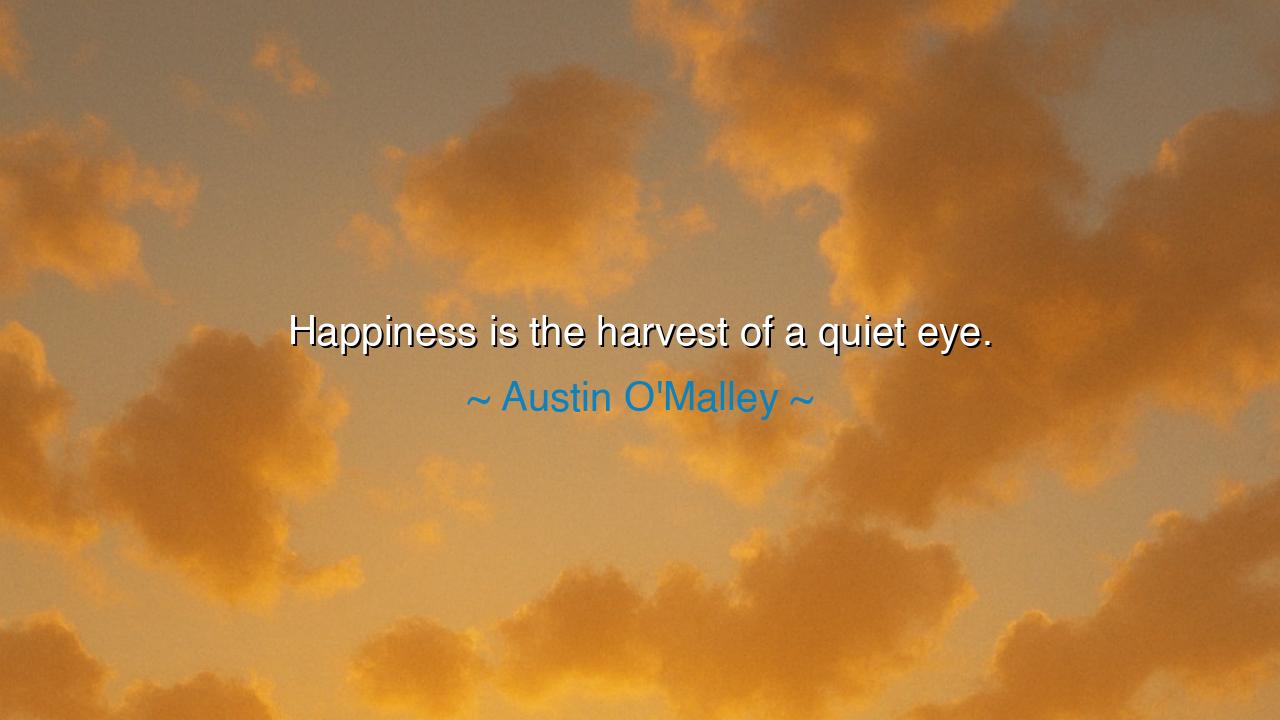
Happiness is the harvest of a quiet eye.






Hear now the serene wisdom of Austin O’Malley, the poet-physician and philosopher of the soul, who once wrote: “Happiness is the harvest of a quiet eye.” In this gentle yet profound saying lies a truth as still and enduring as dawn over a calm sea. For happiness, O’Malley teaches, does not come from the restless chase, nor from the loud triumphs of the world, but from the inward gaze that sees life as it is — simple, fleeting, and sufficient. The quiet eye is the eye of peace, of patience, of understanding. It is the vision that does not rush to judge, nor hunger to possess, but beholds all things in gratitude. From such vision grows the true harvest of happiness, deep-rooted and imperishable.
Austin O’Malley lived in the late nineteenth and early twentieth centuries — a man of learning, both healer of bodies and thinker of hearts. He walked in an age of growing noise: an era of ambition, invention, and ceaseless striving. Yet amid the rising storm of progress, he discerned a sacred stillness that men had forgotten — the ancient peace of the soul that neither haste nor power can buy. His words were written as a remedy for the fever of modern life, a reminder that joy is not found by running faster, but by learning to see more clearly. He taught that the eye — symbol of our perception — becomes the garden where happiness either flourishes or withers. When clouded by greed or envy, it sees only lack; but when quiet, it gathers light from all that lives.
To possess a quiet eye is to live in harmony with the world. It is to see beauty in imperfection, meaning in simplicity, and peace in stillness. The restless mind, forever seeking more, passes by the treasures that lie beneath its feet. The quiet eye, however, beholds them and rejoices. It watches the passing of the seasons without despair, for it knows that all things bloom and fade in their appointed time. The one who sees with such an eye is not blinded by desire nor darkened by fear; he walks through life as a farmer walks his field — patient, observant, content to wait for the ripening of the crop. His happiness is not wild excitement but steady fulfillment, born from acceptance and gratitude.
Consider the life of Leonardo da Vinci, whose restless genius found its peace not in glory but in observation. He gazed upon the curve of a bird’s wing, the shimmer of light on water, the anatomy of a leaf — and in that stillness of seeing, he found wonder. His notebooks overflowed not merely with invention but with reverence. Leonardo’s eye was quiet, and thus he saw what others missed. His joy came not from conquest, but from contemplation. He teaches us, as O’Malley did, that happiness is not a prize we seize but a fruit we grow — slowly, attentively, through the cultivation of perception and peace.
There is also the quiet lesson of Mother Teresa, who in the slums of Calcutta found happiness not in comfort but in service. Her gaze was not fixed on the ugliness of suffering but on the divine spark within each soul. Where others saw despair, her quiet eye saw the face of God. This is the highest form of vision — to see beyond the surface of the world, into its sacred heart. The noise of complaint, fear, and ambition cannot coexist with such clarity. Only stillness gives the eye power to see truth, and truth, once seen, brings peace that cannot be shaken.
To have a quiet eye, then, is not to close one’s eyes to the world’s pain, but to behold it without losing hope. It is to see the storms of life and remain steady, to witness both joy and sorrow and know that both are passing clouds upon the same eternal sky. From this steadiness arises a deep happiness, not fragile or fleeting, but enduring — the calm joy of a soul that trusts the rhythm of existence. Such happiness does not shout or boast; it simply abides, like the golden field awaiting harvest after the patient rains.
So, my child, take this wisdom into your heart: seek not happiness in the restless pursuit of more, but in the quiet cultivation of your gaze. Each day, pause and look upon the world with gratitude. See beauty where others see routine, see lessons where others see burdens, and see light even in your own shadow. Learn to let the heart grow still and the eye grow gentle. For when your seeing becomes peaceful, your living will follow. In that quietness, happiness will ripen of its own accord, like fruit upon the vine, needing no force — only the sunshine of awareness and the patience of the soul.
Thus spoke Austin O’Malley, the healer who understood that the truest medicine for the human heart is stillness. “Happiness is the harvest of a quiet eye.” Let your vision be calm, your spirit humble, and your perception pure. For the one who sees quietly sees truly — and the one who sees truly cannot help but be happy.






AAdministratorAdministrator
Welcome, honored guests. Please leave a comment, we will respond soon